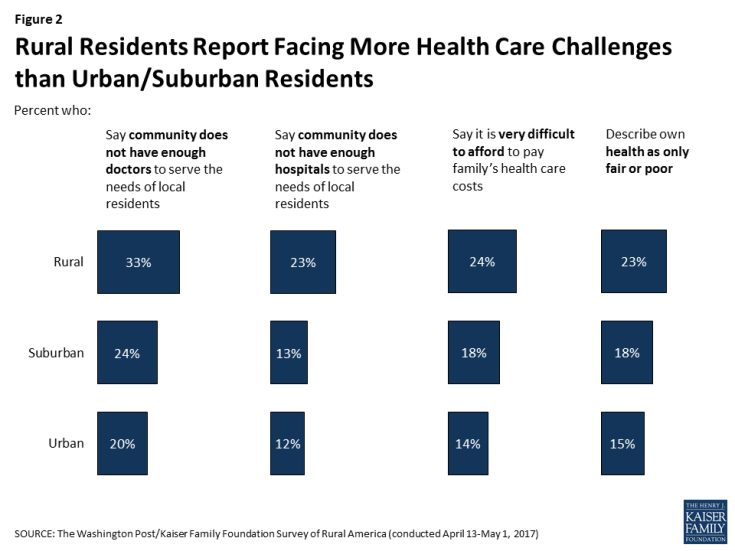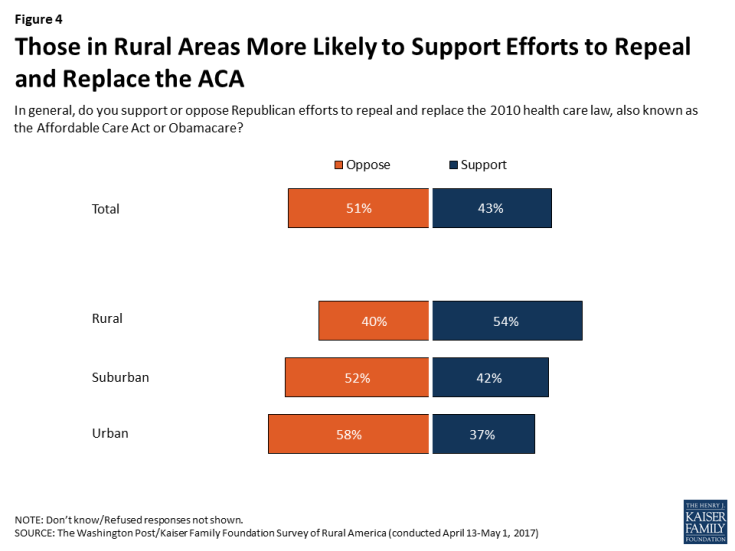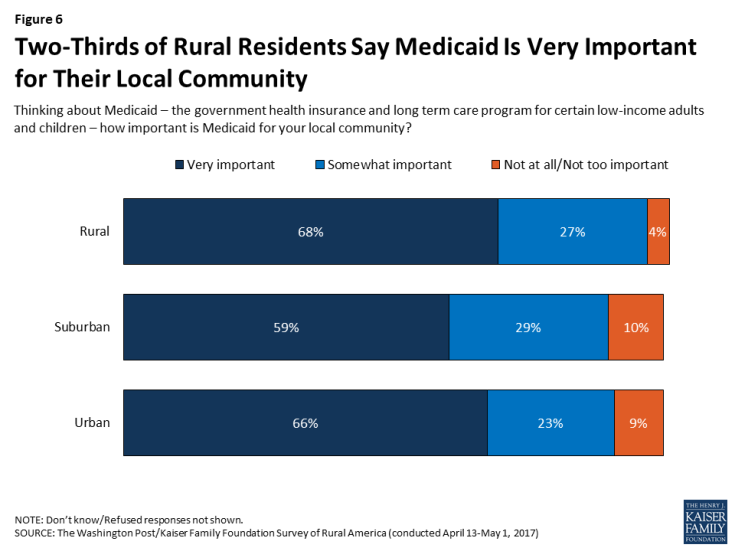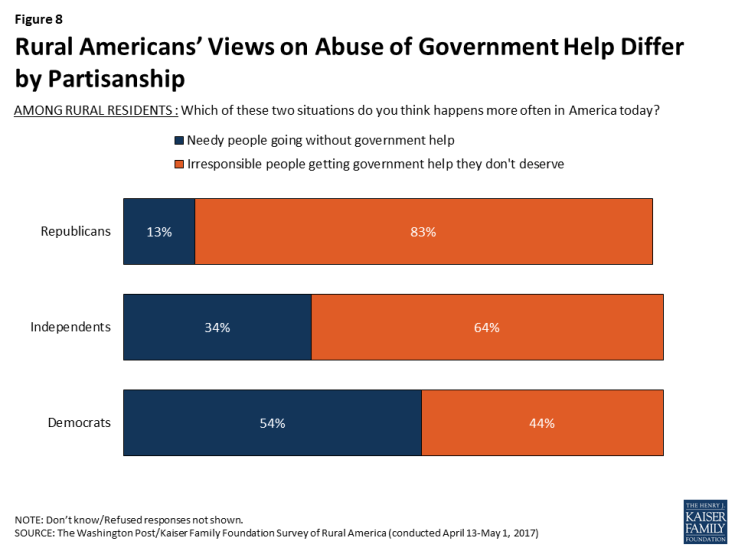The Health Care Views and Experiences of Rural Americans: Findings from the Kaiser Family Foundation/Washington Post Survey of Rural America
Introduction
In partnership with The Washington Post, the Kaiser Family Foundation conducted the Survey of Rural America to gauge the views and experiences of people living in small towns and rural areas across the United States, and how they are similar or different from those in urban and suburban settings. In part, the survey was designed to shed light on the political views of those living in rural counties where Donald Trump scored a 26-percentage-point victory over Hillary Clinton in the 2016 presidential election, a substantial increase from Mitt Romney’s 16-point margin over Barack Obama in 2012. In addition to the survey, Kaiser and The Post conducted two focus groups with rural voters: one with people who voted for Mr. Trump in the general election and one with people who voted for Mrs. Clinton or someone else.1 The groups were held in Ashtabula County, Ohio, a rural county that President Obama won by 12 percentage points in 2012 and President Trump won by 19 points in 2016.
This brief explores where health care fits in rural residents’ political views and also examines how rural Americans’ health care experiences compare with their urban and suburban counterparts.
Survey Findings
Health Care as a Problem Facing Rural Communities
When residents of small towns and rural areas are asked about the biggest problem facing their communities, health care is not high on the list. Lack of jobs is overwhelmingly seen as the top problem in these areas (named by 21 percent in an open-ended question), followed by drug abuse (14 percent) and general concerns about the economy (8 percent). Just 2 percent name the cost or availability of health care as the most pressing problem.
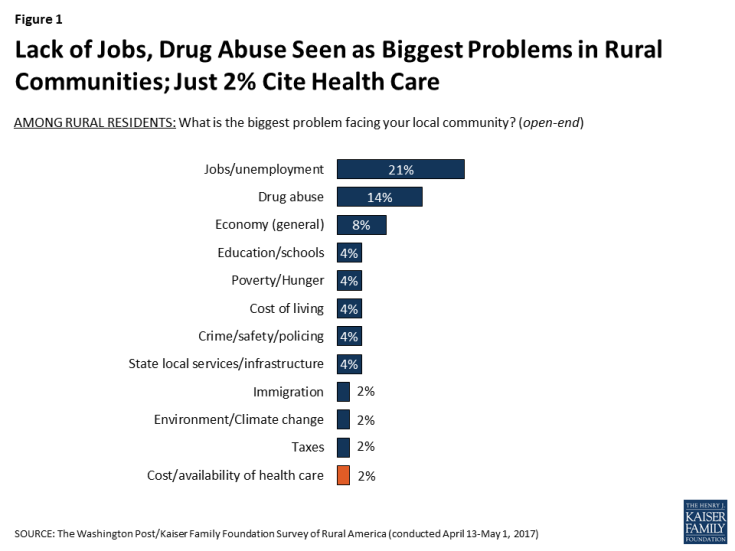
Figure 1: Lack of Jobs, Drug Abuse Seen as Biggest Problems in Rural Communities; Just 2% Cite Health Care
This concern about lack of job opportunities and drug abuse as the main challenges for rural areas was echoed in the focus groups, where participants overwhelmingly mentioned economic decline and drug addiction as the biggest problems in their community. A common theme in both groups was the inability to find jobs paying more than minimum wage, and most participants said they knew someone who had problems with heroin or prescription painkillers.
Focus Group Participants on Job Opportunities:
“The blue-collar jobs are here. If you are a white-collar employee, then that’s not here. That’s not Ashtabula County. But if you are a blue-collar worker, you can get out and shovel sidewalks, you wash dishes, you clean barns…those jobs are there.” – Male, age 45, Trump voter
“Those are 25 hour or 30 hour a week jobs. Finding a 40 hour a week job is almost impossible.” – Male, age 57, Clinton voter
“Definitely in this area, that’s what you have. You have McDonald’s. You have Walmart, You have Family Dollar…you know all those little stores that pay minimum wage. And really, you need 2 or 3 minimum wage jobs to successfully grow your family.” – Female, age 52, Clinton voter
Focus Group Participants on Drug Addiction:
“Seems like everybody knows somebody who has a family member that overdosed on drugs, or in rehab, or something like that.” – Male, age 57, Clinton voter
“Some of the girls that I work with have friends that [say], oh this person had to go to this funeral, had to go to that funeral.” – Female, age 53, Trump voter
“It’s an epidemic, the heroin epidemic. It’s outrageous…It doesn’t matter where you live.” – Female, age 59, Clinton voter
“Why does the public have to pay for drug rehab?” – Male, age 64, Clinton voter
Another participant in response: “I understand what you are saying, but also you are probably just thinking of that stereotypical junkie… I went to a drug rehab and it was because I was prescribed prescription sleeping pills from my doctor and I got so addicted to them… I checked myself into a drug rehab facility cause I had to get that out of my system, and that was my doctor’s fault.” – Female, age 36, Clinton voter
While health care access is not top-of-mind for most residents as the biggest problem in their community, people in small towns and rural areas are more likely than those in urban and suburban areas to report various health care challenges. For example, rural residents are more likely than other Americans to think that their community does not have enough doctors or enough hospitals to serve the needs of local residents2, to say it is very difficult to afford to pay the cost of their family’s health care, and to describe their own health as only fair or poor. Within rural counties, the uninsured, those with lower incomes, and racial and ethnic minorities are more likely than their counter parts to report struggling with health care access and cost (see Appendix A).
Economic anxiety about affording health care was also echoed in the focus groups.
Focus Group Participants on Health Care Affordability:
“The problem with the health care is that my copays, my deductible, the prescriptions… I pay outrageous amounts because I don’t get assistance.” – Female, age 59, Clinton voter
“I’m grateful I have insurance, but I just see the changes. I’ve seen coverage go from here [indicates a level high in the air] every year to here [indicates a lower level]. Deductibles are high.” – Female, age 50, Trump voter
“I haven’t had health insurance in over 10 years. I’ve only had maybe one or two instances that I’ve had to see somebody and that ended up being $100 out of pocket, which isn’t terrible. Luck’s been on my side at the same time. My son has Medicaid…but my wife doesn’t have anything. We’re just coasting along. I’m hoping to have a good job later on this year that’s going to cover everything.”- Male, age 41, Johnson voter
The Politics of Health Care and Support for ACA Repeal Efforts
Before examining rural Americans’ views on health care policy, it’s important to acknowledge that partisan identification tends to lean more Republican in rural areas than it does in the country as a whole. About three in ten (29 percent) rural residents identify as Republicans – higher than the shares in suburban and urban areas – while about a quarter (26 percent) of those in rural areas consider themselves Democrats (similar to suburban areas but significantly lower than the 37 percent of urban residents who call themselves Democrats).
| Table 1: Political Party Affiliation by Urban, Suburban, and Rural Definitions | |||
| Generally speaking, do you usually think of yourself as: | Rural | Suburban | Urban |
| A Democrat | 26% | 28% | 37% |
| A Republican | 29 | 23 | 17 |
| An Independent | 34 | 40 | 32 |
| Something else (Vol.) | 5 | 8 | 10 |
| Don’t know/Refused | 6 | 1 | 4 |
Not surprisingly given their differing partisanship, rural residents are more likely than urban and suburban residents to say they approve of the way Donald Trump is handling his job as president; 54 percent of those living in rural areas say they approve, compared with 44 percent in suburban areas and 32 percent in urban areas. However, rural residents express more confidence in the president’s policies when it comes to preserving freedoms and preventing terrorism than they do in the areas of jobs and health care. While six in ten rural residents say they are very or somewhat confident that President’s Trump’s policies will protect their individual freedoms (61 percent) and keep the country safe from terrorism (57 percent), fewer say they are confident his policies will create jobs (51 percent) or improve health care (47 percent) where they live. Not surprisingly, on each of these measures, Republicans in rural areas are much more likely than Democrats to say they are confident that President Trump’s policies will lead to improvements.
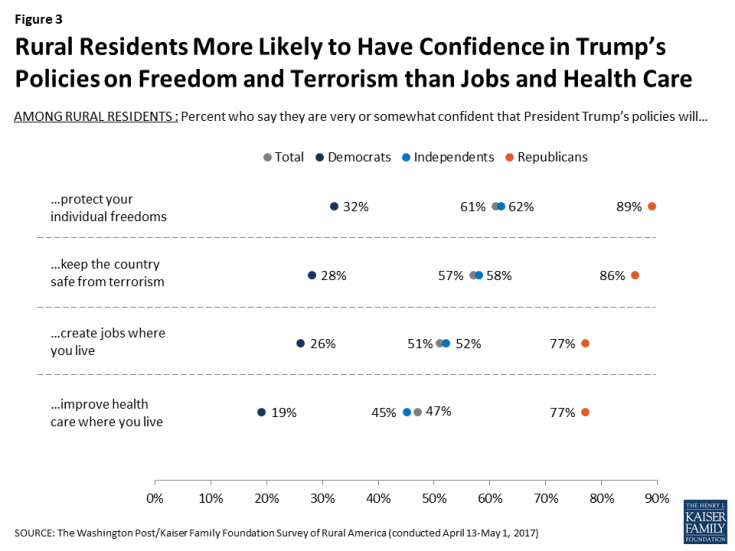
Figure 3: Rural Residents More Likely to Have Confidence in Trump’s Policies on Freedom and Terrorism than Jobs and Health Care
Reflecting their partisan orientation, rural residents are also more likely than urban and suburban residents to say they support Republican efforts to repeal and replace the Affordable Care Act (ACA).3 Just over half (54 percent) of rural Americans say they support such efforts, compared with closer to four in ten of those living in suburban and urban areas (42 percent and 37 percent, respectively).
While partisanship is the biggest divider in how Americans view the ACA, the survey finds that among Democrats and independents, rural residents are more likely than their urban and suburban counterparts to support Republican efforts to repeal and replace the law. About half (52 percent) of rural independents say they support such efforts, compared with 38 percent of independents in urban and suburban areas. And while most Democrats are opposed, 23 percent of rural Democrats say they support the Republican efforts to repeal and replace the ACA compared with just 12 percent of urban and suburban Democrats.
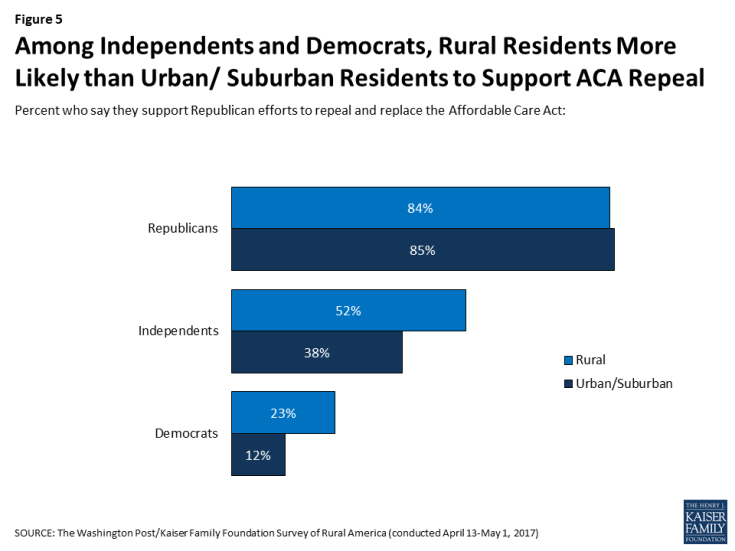
Figure 5: Among Independents and Democrats, Rural Residents More Likely than Urban/ Suburban Residents to Support ACA Repeal
In the focus groups, which were held in the evening on the same day the House of Representatives passed the American Health Care Act, few participants were aware of any details about the Republican plan, and only one participant in each group knew that the House had voted that day. In the Trump voter group, frustration with the ACA centered around the high cost of premiums and high deductibles (though one Trump voter mentioned that he had coverage purchased through an ACA exchange and was very happy with the coverage).
Focus Group Participants on the ACA and Health Reform:
“[Obamacare] saved my wife’s life.” – Male, age 52, Trump voter
“I experienced the exact opposite of you with Obamacare. It was $2,300 for me and my six kids a month. I can’t afford that. I had a better rate from Blue Cross Blue Shield. It was only $850 a month… I still keep that because the Obamacare wouldn’t work for me.” – Male, age 45, Trump voter
“If you’re working at McDonalds, you can afford Obamacare. Because they will hook you up with that…it goes off your income.” – Male, age 52, Trump voter
“I had a friend who was very pro Obama…Her deductible was next to nothing. Everything was getting paid for. About a year later she said, yea I’m shopping for new coverage because it went through the roof…So that was kinda eye opening because she was one of his staunchest supporters. She turned. I don’t know if she turned against him, but against Obamacare anyway.” – Female, age 62, Trump voter
In reference to the Republican ACA replacement plan: “I know they’re trying to make it a little more fair. Lower the copays. Lower the annual payments you have to make. Hopefully they can do it. That’s a difficult job.” – Male, age 42, Trump voter
In reference to the Republican ACA replacement plan: “If you’re going to make it as affordable as car insurance I’ll climb aboard.” – Male, age 41, Johnson voter
“I think it’s luck that Congress took 7 years fighting the Affordable Health Care Act and now they’re saying, oh now we gotta fix it. You really didn’t want to fix it. You just wanted to say you wanted to fix it. It’s just lip service so far.” – Male, age 52, Clinton voter
Rural Residents’ Views of Medicaid
Other research has shown that Medicaid plays a central role in helping to fill gaps in health insurance coverage in rural areas.4 The survey finds that rural residents perceive this importance, with two-thirds (68 percent) saying that Medicaid is “very important” for their local community and another 27 percent saying it is “somewhat important.” The share saying Medicaid is very important is somewhat higher in rural areas than in suburban areas (59 percent) but similar to urban areas (66 percent).
At the same time that rural residents see Medicaid as important for their community, they also express concerns about abuse of government benefits in general. Roughly two-thirds (64 percent) of rural residents say it is more common in America for irresponsible people to get government help they don’t deserve, while one-third (32 percent) say it’s more common for needy people to go without government help. Suburban residents also lean towards thinking it is more common for irresponsible people to get undeserved help (55 percent versus 40 percent), while urban residents are more evenly split (48 percent versus 47 percent).

Figure 7: Rural Residents More Likely to Say Irresponsible People Often Get Government Help They Don’t Deserve
The concern about abuse of government benefits in rural areas is largely driven by Republicans, 83 percent of whom say it is more common for irresponsible people to get government help they don’t deserve. Still, about two-thirds (64 percent) of rural independents and over four in ten (44 percent) rural Democrats express the same view.
Concern about abuse of government benefits in general – and in Medicaid in particular – was expressed in the focus groups by both those who voted for President Trump and those who did not.
Focus Group Participants on Medicaid and Abuse of Government Benefits:
“My husband has a job and we have health care through him. But the deductibles are high. Somebody that’s getting welfare, they’ve got a cough, and [say] oh I’m going to the doctor. I better be dead before I go to the doctor because I’ve got to pay for it.” – Female, age 50, Trump voter
“A lot of [people on Medicaid] will get medicine and go out and sell that medicine for a lot of money. Then they’ll take their EBT card, go see certain people, 50 cents on a dollar, you want to go shop! It happens all day long.” – Male, age 52, Trump voter
“A lot people are still working under the table on [Medicaid]. They’re making $10 an hour, tax deferred, not have to pay tax…not have to file income tax. And getting all the benefits for free!” – Male, age 64, Clinton voter
“I was off of work. Now, I’m covered by the state [Medicaid]. And I have the best medical coverage ever. So every single thing that I needed to have done, I’m trying to get it done right now while I’m off of work because by the time I go back to work, I’m gonna have my huge deductible, huge copay… [The people on Medicaid] have the very best insurance that none of the rest of us can afford.” – Female, age 36, Clinton voter
Conclusion
Rural Americans express deep concerns about forces they see as eroding their communities, including economic decline, job losses, and an increase in drug abuse and addiction. Health care does not top their list of concerns, yet there are signs that residents of rural counties face particular struggles when it comes to health care access and costs. While partisanship divides rural residents’ views on health care policy just as it does in the rest of the country, rural Democrats and independents appear more open to Republican plans to repeal and replace the ACA than their counterparts in urban and suburban areas. This may be due in part to a more conservative orientation among rural Americans and their relatively greater concern about abuse of government benefits. For example, focus group participants across partisan lines expressed frustration about lower-income people being able to access Medicaid while those with slightly higher incomes struggle to afford coverage. Focus group findings also suggest that while partisanship divides rural residents on questions of health care politics, they are more united in their concern about the high cost of health care, a finding that echoes the results of many previous Kaiser surveys of the nation as a whole.5

